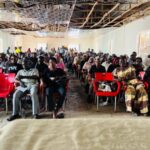ECOWAS at 50: Why the AES Countries Must Not Fail dateline to Return for a Stronger West Africa.
By Raymond Enoch
As ECOWAS approaches its golden jubilee in 2025, the milestone offers more than a moment of celebration—it presents a crucial opportunity for stocktaking, re-evaluation, and recommitment to the ideals that gave birth to the regional bloc in 1975. At fifty, the Economic Community of West African States (ECOWAS) is not just a regional institution—it is a legacy, a pillar of integration, and a symbol of hope for over 400 million people.

Established by the Treaty of Lagos, ECOWAS was conceived as a vehicle for economic cooperation, regional integration, and democratic governance across West Africa. Its founding document was not just a bureaucratic charter; it was a declaration of purpose—to insulate the region from cycles of military rule, to promote inclusive governance, and to ensure shared prosperity through unity.
But the journey has not been without challenges. In recent years, the democratic fabric of the region has come under renewed strain with the emergence of military juntas in Mali, Niger, and Burkina Faso. These three nations—collectively known as the Alliance of Sahel States (AES)—have chosen a path of isolation, withdrawing from ECOWAS in defiance of shared values and protocols.
This decision poses not just a political dilemma but a fundamental test for the regional body. Will ECOWAS tolerate the subversion of its founding principles, or will it rise to the occasion and reaffirm its commitment to democratic governance and regional solidarity?
The AES countries have, paradoxically, continued to engage in projects tied to the ECOWAS framework, even while denouncing its institutions and leadership. Their reliance on ECOWAS-rooted systems—ranging from infrastructure projects to economic arrangements—exposes the contradictions in their stance. Some of these same military regimes rail against foreign influence while maintaining commercial ties with French companies. This double standard undercuts the credibility of their rhetoric and undermines the collective progress the region has made over the last five decades.
The ECOWAS Commission has not only facilitated economic collaboration but has also birthed several institutions that underpin regional development today—the ECOWAS Parliament, the ECOWAS Court of Justice, WAMI, WAPP, WAPIS, the Gender Development Centre, and WARM, among others. These bodies have empowered citizens, upheld justice, and advanced gender equity and regional infrastructure. They are the embodiment of ECOWAS’ vision for a West Africa that thrives on cooperation, not division.
The military regimes in the AES states must not ignore this legacy. Rather than using misinformation and populist narratives to justify prolonged military rule, they should take advantage of ECOWAS’ open-door policy and rejoin the community. The Treaty that formed ECOWAS provides mechanisms for mediation, accountability, and reintegration. Testing the strength of that Treaty by choosing prolonged isolation would be a disservice to the citizens of these nations.
As the region looks toward the future, ECOWAS must remain firm in its commitment to democratic principles while leaving the door open for reconciliation. The return of Mali, Niger, and Burkina Faso is not just desirable—it is essential for a cohesive and resilient West Africa.
In this golden jubilee year, ECOWAS must embrace both reflection and resolve. The stakes are too high, and the future too important, to let disunity define the next fifty years.
Raymond Enoch is a media professional and policy analyst with a passion for regional integration, democracy, and governance in Africa. He writes regularly on West African affairs, with a focus on institutions and the power of community-driven development.









